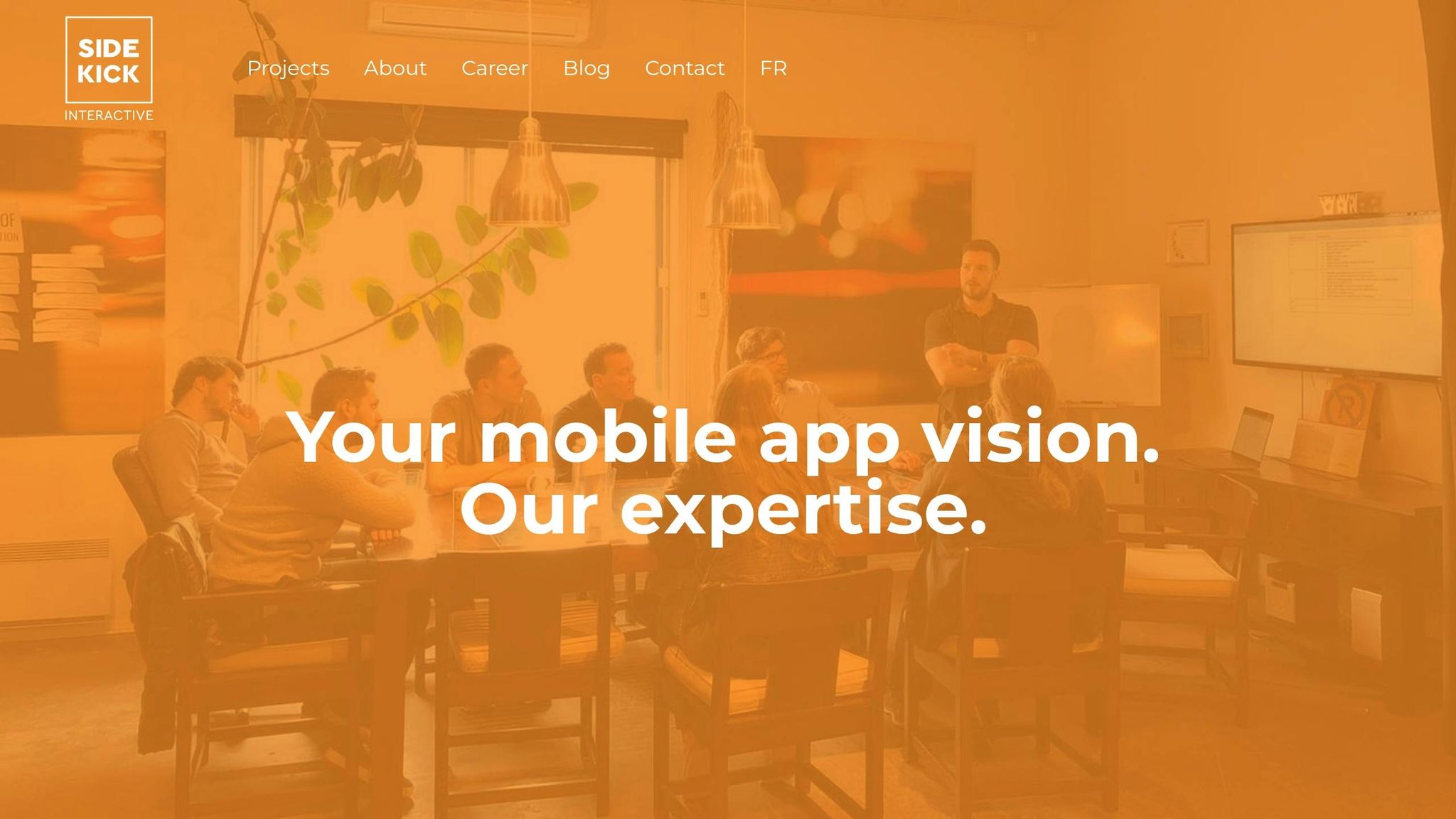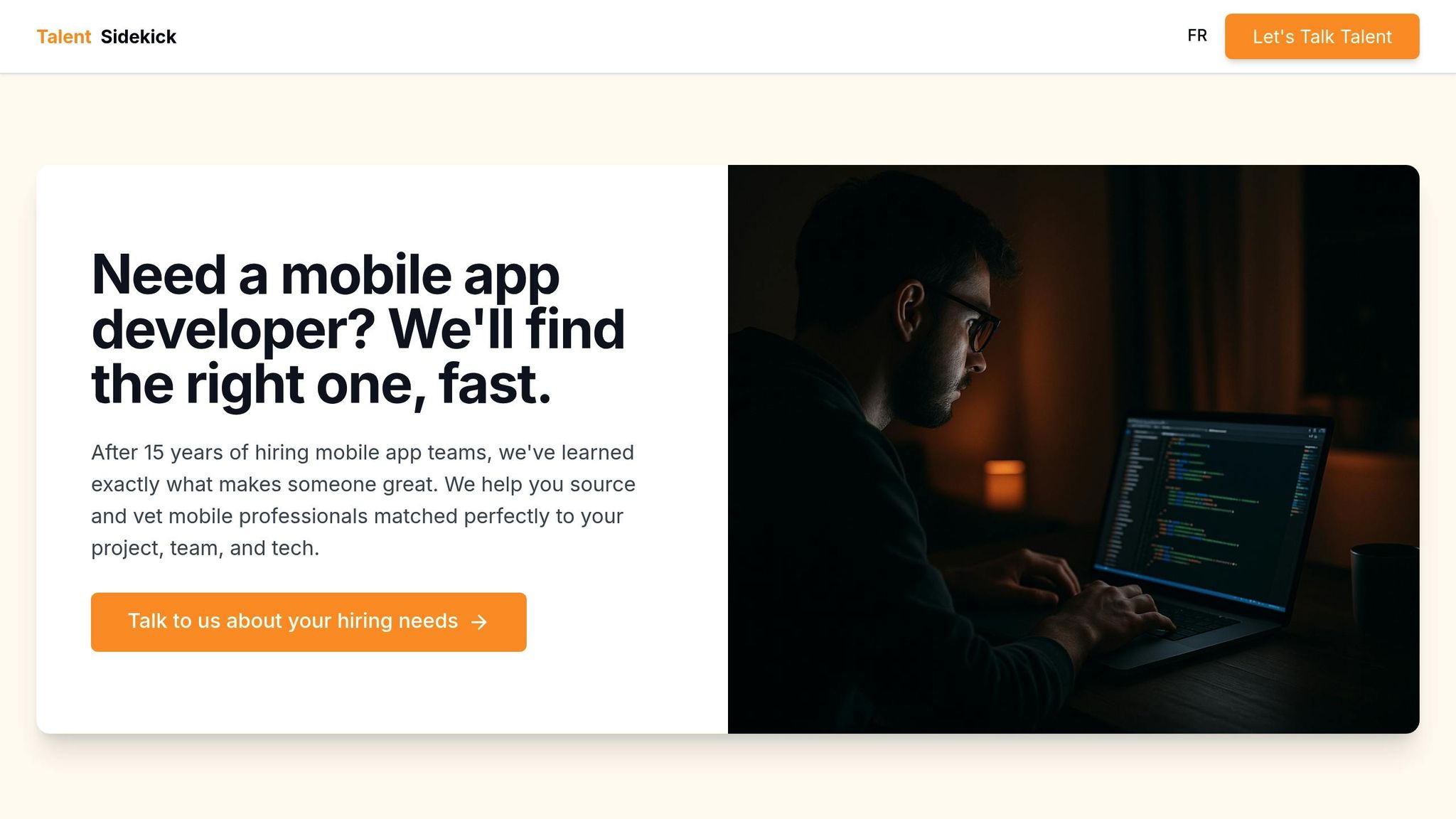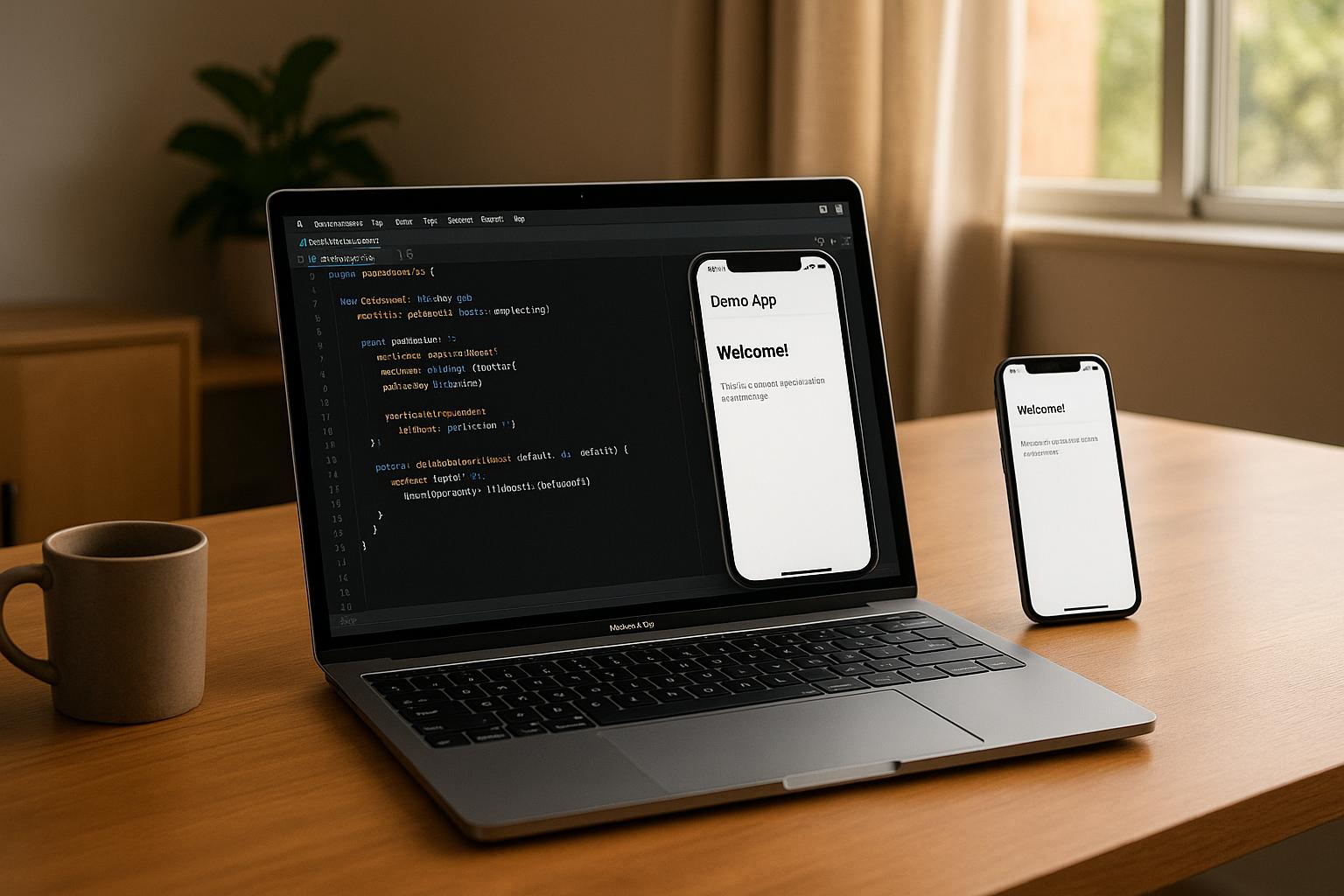Hiring the right mobile developer can be challenging, but hands-on assessments are the most effective way to evaluate their skills. Here’s what works:
- Coding challenges: Test problem-solving and technical abilities in 3–4 hours.
- Project-based tasks: Assign tasks like API integration or feature development to assess deeper skills.
- Pair programming: Observe real-time collaboration, debugging, and communication.
- Portfolio reviews: Examine past work for code quality, complexity, and documentation.
Standard hiring methods often fail to evaluate critical skills like debugging, performance optimization, and security. Using tools like HackerRank or Codility, along with structured scoring rubrics, can streamline the process. Combining multiple methods ensures a thorough evaluation of both technical and interpersonal skills.
For businesses seeking expertise, services like Talent Sidekick specialize in identifying developers who can meet complex project needs quickly and efficiently.
Mobile Developer Interview Questions with Answer Examples
Practical Assessment Methods for Mobile Developers
When evaluating mobile developers, hands-on assessments go beyond traditional interviews to showcase a candidate’s practical skills. These methods highlight how developers approach problems, collaborate, and handle the challenges of modern mobile development.
Coding Challenges
Coding challenges are a great way to simulate the day-to-day tasks of mobile development. These exercises should focus on real-world scenarios that align with your specific mobile environment.
- Aim for challenges that take around 3–4 hours to complete. This strikes a balance between allowing candidates to demonstrate their abilities and respecting their time.
- Tailor the tasks to the platform in question, whether it’s iOS, Android, or cross-platform frameworks. This ensures you’re testing the skills that matter most for the role.
- Define clear evaluation criteria before candidates begin. Outline what constitutes strong, average, or weak performance in areas like technical execution, code quality, and problem-solving. This helps maintain fairness and minimizes bias.
For a deeper dive into a candidate’s approach, consider assigning take-home projects.
Project-Based Tasks
Take-home projects give candidates the chance to showcase their technical decision-making and problem-solving skills in greater depth. These tasks allow them to work at their own pace while tackling more complex challenges.
- Assign projects that involve building production-ready modules or integrating APIs, such as user authentication or data synchronization. Pay close attention to how they handle error states, network issues, and data validation.
- For roles requiring niche expertise, include tasks that involve advanced technologies like 3D scanning or Bluetooth Mesh. This helps gauge their ability to adapt to evolving tools and platforms.
After reviewing take-home projects, you can further evaluate a candidate’s skills through pair programming sessions.
Pair Programming Sessions
Live coding sessions provide valuable insight into how a candidate thinks and collaborates in real time. These sessions are an opportunity to observe how candidates break down complex problems, ask clarifying questions, and weigh different approaches before diving into implementation.
- Assess their communication skills, particularly their ability to explain technical concepts clearly. This is especially important for roles requiring collaboration with non-technical stakeholders.
- Watch how they handle real-time debugging. Candidates who approach unexpected challenges calmly and systematically demonstrate strong problem-solving abilities.
- Pay attention to how they respond to feedback. Constructive dialogue and openness to suggestions are key indicators of teamwork and adaptability.
While live sessions highlight real-time problem-solving, reviewing a candidate’s past work offers a broader perspective on their long-term coding habits.
Portfolio and Code Reviews
A candidate’s portfolio can reveal a lot about their experience and coding standards. Public repositories, open-source contributions, and personal projects offer a window into their skills and development style.
- Evaluate code quality by looking at readability, organization, and adherence to platform conventions. Consistent naming, appropriate design patterns, and clear separation of concerns are all signs of strong coding practices.
- Review the complexity of their projects to see if they’ve tackled advanced challenges, such as intricate state management or integrating multiple third-party services.
- Examine commit histories for evidence of disciplined development. Regular, well-documented commits often reflect a thoughtful and iterative approach to coding.
- Open-source contributions can signal a developer’s engagement with the broader community and their commitment to staying current with industry trends.
- Strong documentation, such as detailed README files and in-code comments, demonstrates professionalism and a focus on creating maintainable, scalable code.
Key Skills and Traits to Evaluate in Mobile Developers
Once you’ve established your assessment methods, it’s time to pinpoint the essential skills and traits that define a strong mobile developer. With only 3.4% of professional coders identifying as mobile developers and 64% of IT recruiters struggling to fill tech roles due to skill shortages, knowing what to prioritize is critical. These skills, alongside practical evaluations, directly influence a developer’s ability to deliver successful projects.
Native App Development Skills
For iOS development, look for proficiency in Swift, along with hands-on experience in SwiftUI and UIKit. For Android, prioritize candidates with strong Kotlin skills, expertise in Jetpack Compose, and a deep understanding of the Android SDK.
Additionally, assess their knowledge of building scalable and secure app architectures, optimizing performance, managing memory, and working with integrated development environments (IDEs).
UI/UX Implementation
A great mobile developer can transform static designs into responsive, functional interfaces that work smoothly across various devices and screen sizes. Look for experience with modern UI frameworks and a solid understanding of platform-specific design guidelines, such as Apple’s Human Interface Guidelines for iOS and Google’s Material Design for Android.
Candidates should also demonstrate their ability to create adaptive interfaces that accommodate different orientations, screen sizes, and accessibility needs.
API and Advanced Technology Integration
Mobile apps often rely heavily on external APIs and cutting-edge technologies. Test candidates with challenges that involve integrating APIs for advanced features like 3D scanning, Bluetooth Mesh, or EV charging systems. Simulating real-world scenarios can reveal how they approach unfamiliar technical tasks. During pair programming sessions, observe how they navigate API documentation, manage authentication protocols, handle network requests, and address errors. Experience with social logins, biometric authentication, and short-lived tokens is also a valuable plus.
Problem-Solving and Debugging
Problem-solving is a cornerstone of mobile development. Evaluate candidates by presenting them with tasks that include embedded bugs. Pay close attention to how they analyze logs, identify root causes, and articulate their debugging process under time constraints.
Version Control and Collaboration
Teamwork is essential in mobile development, so strong Git skills are non-negotiable. Assess their understanding of branching strategies, merge conflict resolution, and their approach to code reviews. Experience with collaborative workflows and team-based development practices is equally important.
Security and Data Compliance
Since mobile apps often handle sensitive user data, developers must demonstrate a strong grasp of secure coding practices and data compliance. This includes secure data storage, encrypting network communications, and defending against common vulnerabilities. Candidates should also know how to implement robust authentication flows and manage sensitive data responsibly. Familiarity with relevant privacy laws and data protection regulations is critical, especially as mobile apps now account for over half of all digital time spent globally. These skills are essential for building trust and ensuring user safety in today’s app-driven world.
sbb-itb-7af2948
Tools and Platforms for Objective Evaluation
To ensure fair and impartial evaluations of mobile development skills, the right tools can turn subjective judgments into clear, data-driven insights. Below, we explore platforms and methodologies designed to standardize and elevate the candidate evaluation process.
Assessment Platforms for Coding and Projects
LeetCode stands out as a go-to platform with a library of over 3,800 coding questions, tailored for honing technical skills and acing interviews. Companies often use it to identify top talent through standardized challenges. Its question bank spans key areas like algorithms, data structures, and system design – core competencies in mobile development.
Codewars provides coding exercises, or "kata", across more than 55 programming languages. Candidates receive instant feedback and can compare their solutions with others, offering a window into their problem-solving strategies and flexibility.
CodinGame takes a creative approach with coding games, puzzles, and challenges that test how candidates perform under pressure. This gamified experience not only evaluates technical ability but keeps candidates engaged during lengthy assessments.
Codility and HackerRank are also widely used platforms, offering structured coding challenges and project-based tasks. These tools simplify the process of assessing technical skills in a consistent and systematic way.
In addition to these platforms, automated tools play a key role in maintaining consistency during code evaluations.
Automated Code Analysis
Automated tools bring speed and accuracy to the evaluation process, catching issues that manual reviews might overlook. They can pinpoint security vulnerabilities, performance inefficiencies, and other critical concerns – factors that are especially important in mobile development.
By applying consistent, standardized criteria, automated analysis ensures a level playing field for all candidates and reduces the potential for human error or bias.
Structured Scoring Rubrics
To complement technical tools, structured scoring rubrics provide clear guidelines for evaluating candidates. These rubrics replace subjective impressions with clearly defined criteria, ensuring evaluations are both fair and consistent.
For mobile development, an effective rubric might evaluate areas like code quality, problem-solving methods, UI implementation, API integration, and debugging skills. Performance levels such as "exceeds expectations", "meets expectations", and "needs improvement" can help break down each skill area.
The process becomes even more reliable when multiple evaluators use the same rubric. Documented scores not only justify hiring decisions but also create a transparent evaluation process.
It’s often helpful to design separate rubrics for different assessment types. For instance, you might use one rubric for coding challenges that focus on technical execution and another for pair programming exercises that emphasize communication and teamwork.
Assessment Methods Comparison Table
Comparison of Methods
Here’s a side-by-side breakdown of various assessment approaches, summarizing their strengths, weaknesses, and ideal use cases. This table connects the earlier detailed discussions with a concise comparison, making it easier to weigh options.
| Method | Strengths | Weaknesses | Best Use Case | Time Investment |
|---|---|---|---|---|
| Coding Challenges | Efficiently evaluate technical skills, test problem-solving abilities, and assess Swift/Kotlin expertise | Time-intensive, repetitive tasks, limited feedback, unrealistic expectations | Initial screening for technical aptitude and problem-solving | 1–3 hours per candidate |
| Project-Based Tasks | Test real-world coding abilities, assess feature development and algorithm design, offer deeper insights | High time commitment for candidates, longer assessment periods, potential to deter qualified applicants | Evaluating mobile development expertise and practical application skills | 4–8 hours per candidate |
| Pair Programming | Improves code quality, reduces bugs, fosters collaboration, and provides strong assessment signals | Expensive to implement, less scalable for large candidate pools | Gauging teamwork, live problem-solving, and interpersonal fit | 2–4 hours per candidate |
| Portfolio Reviews | Highlights real-world projects, showcases practical skills, and reveals coding style | May overlook individual contributions, time-consuming to review, and might miss key skill areas | Evaluating project complexity and overall development approach | 30–60 minutes per candidate |
Pair programming stands out for its collaborative benefits, with 15% fewer defects in code and 96% of practitioners reporting greater job satisfaction compared to solo programming. On the other hand, coding challenges often spark frustration among developers, who see them as time-consuming and lacking actionable feedback, even though HR departments value them as screening tools.
Project-based tasks offer a middle ground, providing a practical way to assess deep technical skills. This aligns with the fact that over 60% of employers prioritize problem-solving abilities when evaluating candidates. Portfolio reviews, while quicker to conduct, uniquely showcase a candidate’s ability to manage complex projects and their overall approach to development.
For the best results, combine multiple methods. Use coding challenges for initial filtering, portfolio reviews for deeper insights, and pair programming for final evaluations. This layered strategy leverages the strengths of each method while reducing their drawbacks.
Time commitments can vary widely, from quick coding challenges to more intensive project-based tasks. Choose your approach based on your team’s availability, the role’s requirements, and your hiring timeline to ensure the best fit for your recruitment process.
Conclusion: Partnering with Sidekick Interactive for Expert Hiring

Comprehensive Evaluation for Smarter Hiring
Hiring mobile developers isn’t just about checking off technical skills – it’s about finding the right balance between expertise and team compatibility. A well-rounded evaluation process, including coding challenges, portfolio reviews, and pair programming, helps confirm both. Tailoring these assessments to your specific needs ensures you’re identifying candidates who truly fit. And when professionals handle these intricate evaluations for you, the process becomes even more effective and manageable.
Why Choose Talent Sidekick?

Sidekick Interactive takes the guesswork out of hiring with its Talent Sidekick service. Instead of navigating the complexities of evaluating candidates yourself, this service simplifies the process by leveraging over a decade of mobile development expertise. Their team understands what it takes to build top-tier apps and can pinpoint developers who not only have the technical skills but also the right mindset to thrive in your organization.
Talent Sidekick doesn’t stop at traditional recruiting methods. They analyze your codebase to ensure candidates are equipped with the exact skills needed for your projects. Every candidate is thoroughly vetted for both technical abilities and interpersonal qualities, ensuring a seamless fit for your team.
With more than 14 years of experience, Sidekick Interactive’s team – based entirely in Canada – maintains strict quality standards. Their streamlined process, which typically takes 3–15 business days from the initial consultation to presenting 1–3 carefully selected candidates, has consistently led to successful projects valued between $50,000 and $199,999. By handling the time-intensive aspects of hiring, they connect you with ready-to-work developers faster and more efficiently.
Sidekick Interactive applies the same level of precision to talent acquisition as they do to their mobile development projects. With a reputation for delivering on time and within budget, Talent Sidekick provides the expertise and efficiency that traditional hiring methods often lack – making it the go-to solution for companies looking to tackle complex development challenges with confidence.
FAQs
Why is it important to use multiple methods to evaluate mobile developers during hiring?
Using different assessment methods offers a comprehensive view of a candidate’s abilities. It allows you to better understand their skills in areas like coding, problem-solving, and handling advanced technologies. Relying on just one type of evaluation can sometimes miss important strengths or weaknesses, so a varied approach minimizes that risk.
By incorporating tools like coding challenges, project-based assignments, and portfolio reviews, you can gain a more accurate sense of how a candidate might handle real-world tasks. This leads to better hiring decisions and improves the chances of selecting someone who truly fits your team and project requirements.
How can businesses fairly and consistently evaluate candidates during the hiring process?
To maintain consistency and impartiality in candidate evaluations, businesses should rely on structured interviews. This means using standardized questions and scoring systems that align directly with the responsibilities of the role. Such an approach reduces bias and ensures every candidate is judged on the same criteria.
It’s also important to establish clear, objective benchmarks for assessing skills, experience, and problem-solving abilities. Equipping interviewers with proper training and incorporating role-specific, practical tasks – like coding exercises or project-based scenarios – can further enhance the fairness and effectiveness of the hiring process.
Why is pair programming a good way to evaluate a candidate’s problem-solving and teamwork skills?
Pair programming is a fantastic way to assess a candidate’s problem-solving and teamwork abilities. It offers a live look at how they tackle challenges and interact with others during a coding task. You can see firsthand how they communicate their ideas, respond to feedback, and maintain critical thinking under pressure.
This approach also sheds light on their technical skills and how they contribute to collaborative problem-solving – key qualities for mobile app development roles. It’s an effective way to gauge how they might operate within a team in real-world scenarios.

